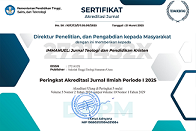Mengalahkan Naluri Membalaskan Dendam: Tafsir Kontekstual terhadap Roma 12:17-21
Abstract
Every human being has the instinct to avenge the bad or evil treatment they receive. The surveys in psychology regarding revenge show that revenge is very complex regarding the various nuances that arise when taking revenge. The complexity of revenge will be confronted with Paul's view of revenge in Romans 12:17-21 which is considered an ideal that is difficult to implement and often ignored. This article aims to provide an alternative interpretation of Romans 12:17-21 by dialoguing Paul's views with findings in the psychology of revenge. The study of the psychology of revenge was carried out through library research with a descriptive qualitative approach. Meanwhile, Paul's views in Romans 12:17-21 are explored using the exegetical method. The research results suggest that every human being not only has the instinct to avenge the crimes and bad behavior they receive but also the instinct to forgive. Dialoguing Paul's views on revenge with the result studies in the study of revenge psychology has shown the richness in both views and gives a new understanding, an alternative interpretation of Romans 12:17-21.
Abstrak
Setiap manusia memiliki naluri membalaskan perlakuan buruk atau jahat yang diterimanya. Hasil survei dalam psikologi tentang pembalasan dendam menunjukkan bahwa pembalasan dendam sangat kompleks terkait berbagai nuansa yang muncul ketika membalaskan dendam. Kompleksitan pembalasan dendam tersebut akan diperhadapkan dengan pandangan Paulus tentang pembalasan dendam dalam Roma 12:17-21 yang dianggap ideal sehingga sulit dilaksanakan dan lebih sering diabaikan. Artikel ini bertujuan untuk memberikan penafsiran alternatif terhadap Roma 12:17-21 dengan mendialogkan pandangan Paulus dengan temuan-temuan dalam psikologi pembalasan dendam. Kajian mengenai psikologi pembalasan dendam dilakukan melalui penelitian pustaka dengan pendekatan kualitatif deskriptif. Sedangkan pandangan Paulus dalam Roma 12:17-21 ditelusuri dengan metode eksegesis. Berdasarkan hasil penelitian ditemukan bahwa setiap manusia tidak hanya memiliki naluri membalaskan tindakan kejahatan dan perilaku buruk yang diterimanya tetapi juga naluri mengampuni. Mendialogkan pandangan Paulus tentang membalaskan dendam dengan hasil penemuan dalam kajian psikologi pembalasan dendam telah menghasilkan menunjukkan kekayaan dalam kedua pandangan tersebut dan melahirkan suatu pemahaman yang baru, suatu alternatif memahami Roma 12:17-21.
Keywords
Full Text:
PDFReferences
Brown, Colin. The New International Dictionary of New Testament Theology. Volume 3. Michigan: Grand Rapids, 1992.
Bruce, F. F. Tyndale New Testament Commentaries: Romans. USA: InterVarsity Press, 1985.
Bryan, Christopher. A Preface to Roman: Notes on The Epistle in Its Literary and Cultural Setting. New York: Oxford University Press, 2000.
Cranfield, C. E. B. Romans 9-16: International Critic Commentary. London & New York: T&T Clark Ltd, 1979.
Day, John N. “‘COALS OF FIRE’ IN ROMANS 12:19-20.” Bibleotecha Sacra 160 (2003).
Dunn, James D.G. World Biblical Commentary: Romans 9-16. Dallas: World Books Publisher, 1988.
Durham, Mary Sherrill. “The Therapist and The Concept of Revenge: The Law of Talion.” The Journal of Pastoral Care 44, No.2 (1990).
End, Th van den. Surat Roma: Tafsiran Alkitab. Jakarta: BPK Gunung Mulia, 1997.
Fitzmyer, Joseph A. Romans: New Translation with Introduction and Commentary. New York: Doubleday, 1993.
Haacker, Klaus. The Theology of Paul’s Letter to The Romans. Cambridge: Cambridge University Press, 2003.
Hub, Bible. “Interlinear Bible.” Accessed October 1, 2022. https://biblehub.com/interlinear/romans/12-17.htm.
———. “Interlinear Bible.” Accessed October 1, 2022. https://biblehub.com/interlinear/romans/12-18.htm.
———. “Interlinear Bible.” Accessed October 1, 2022. https://biblehub.com/interlinear/romans/12-19.htm.
———. “Interlinear Bible.” Accessed October 1, 2022. https://biblehub.com/interlinear/romans/12-20.htm.
———. “Interlinear Bible.” Accessed October 1, 2022. https://biblehub.com/interlinear/romans/12-21.htm.
Indonesia, Lembaga Alkitab. Alkitab Terjemahan Baru. Jakarta: Percetakan Lembaga Alkitab Indonesia, 1996.
Jaffe, Eric. “The Complicated Psychology of Revenge.” Accessed October 20, 2023. https://www.psychologicalscience.org/observer/the-complicated-psychology-of-revenge.
Kasemann, Ernst. Commentary on Romans. Michigan: Wm. B. Eerdmans Publishing Co, 1980.
Marxen, Willi. Pengantar Perjanjian Baru: Pendekatan Kritis Terhadap Masalah-Masalahnya. Jakarta: BPK Gunung Mulia, 1994.
McDermott, Rose, Anthony C. Lovez, and Peter K. Hatemi. “‘Blunt Not the Heart Enrage It’ The Psychology of Revenge and Deterrence.” Texas National Security Review 1, no. 1 (2017).
Moo, Douglas J. The Epistle to The Romans: The New International Commentary on New Testament. The Epistle to The Romans: The New International Commentary on New Testament: Wm. B. Eerdmans Publishing Co, 1996.
Nataniel, Demianus. “PAULUS DALAM KONFLIK ANTAR UMAT BERAGAMA: Membaca Konflik Di Maluku Utara Berdasarkan Sikap Nasionalisme Paulus.” GEMA TEOLOGIKA Vol.4 No.2 (2019).
Olson, Dennis. “Revenge, Forgiveness and Sibling Rivalry: A Theological Dialogue between Scripture and Science.” Ex Auditu 28 (2012).
Stam, Cornelius R. Commentary on The Epistle of Paul to The Romans. Stevens Point, Wisconsin: Worzalla Publishing Co, 1984.
Stott, John. Romans: God’s Good New for the World. USA: InterVarsity Press, 1994.
Talbert, Charles H. Romans: Smyth & Helwys Bible Commentary. Macon, Georgia: Smyth & Helwys Publishing, 2002.
Toews, John. E. Romans: Believers Church Biblical Commentary. Scottdale: Herald Press, 2004.
Wenno, Vincent Calvin. “‘INISIATIF UNTUK MENGASIHI’ Membaca Etika Paulus Dalam Roma 12:9-21 Serta Implikasinya Bagi Pembangunan Perdamaian.” Kenosis Vol.3 No.2 (2017).
Zaluchu, Sonny Eli. “Strategi Penelitian Kualitatif Dan Kuantitatif Di Dalam Penelitian Agama.” Evangelikal: Jurnal Teologi Injili Dan Pembinaan Warga Jemaat 4 1 (2020): 28–38.
DOI: https://doi.org/10.46305/im.v4i2.183
Refbacks
- There are currently no refbacks.
Copyright (c) 2023 Immanuel: Jurnal Teologi dan Pendidikan Kristen

This work is licensed under a Creative Commons Attribution-NonCommercial-ShareAlike 4.0 International License.
Immanuel indexed by:
Immanuel: Jurnal Teologi dan Pendidikan Kristen
Published: Sekolah Tinggi Teologi Sumatera Utara
Website Institusi: stt-su.ac.id
Address: Jl. Sembada No. 32, Titi Rantai, Kec. Medan Baru, Kota Medan, Sumatera Utara 20131
ISSN: 2721-432X (online), 2721-6020 (print).














